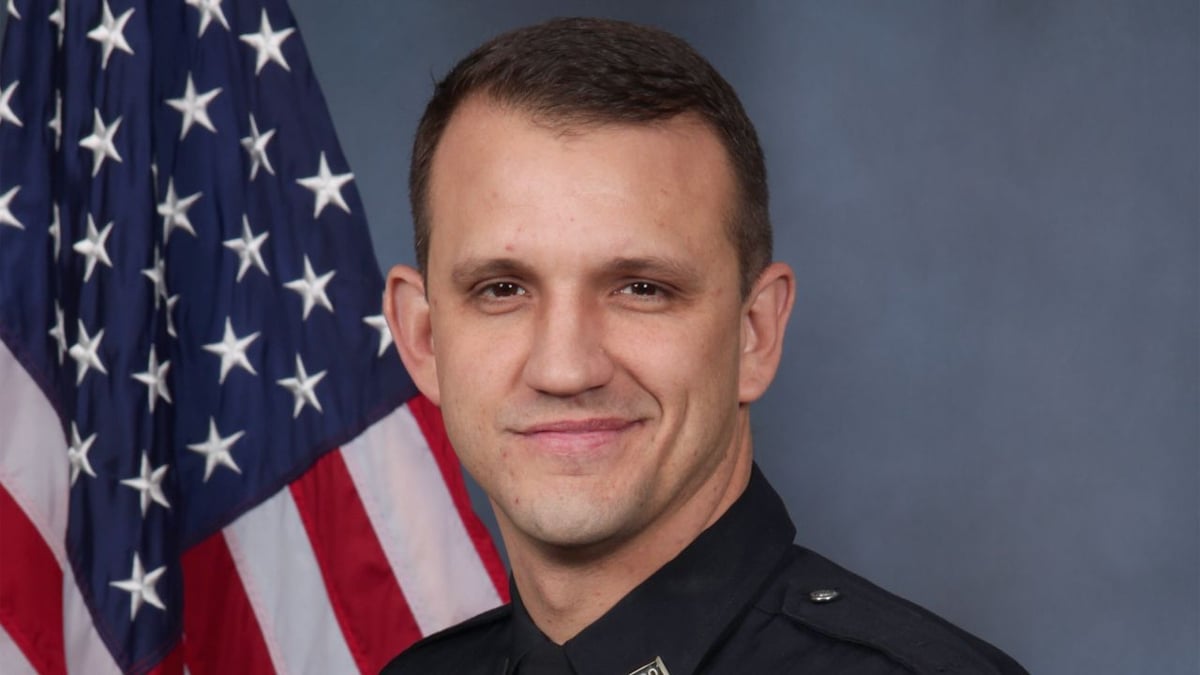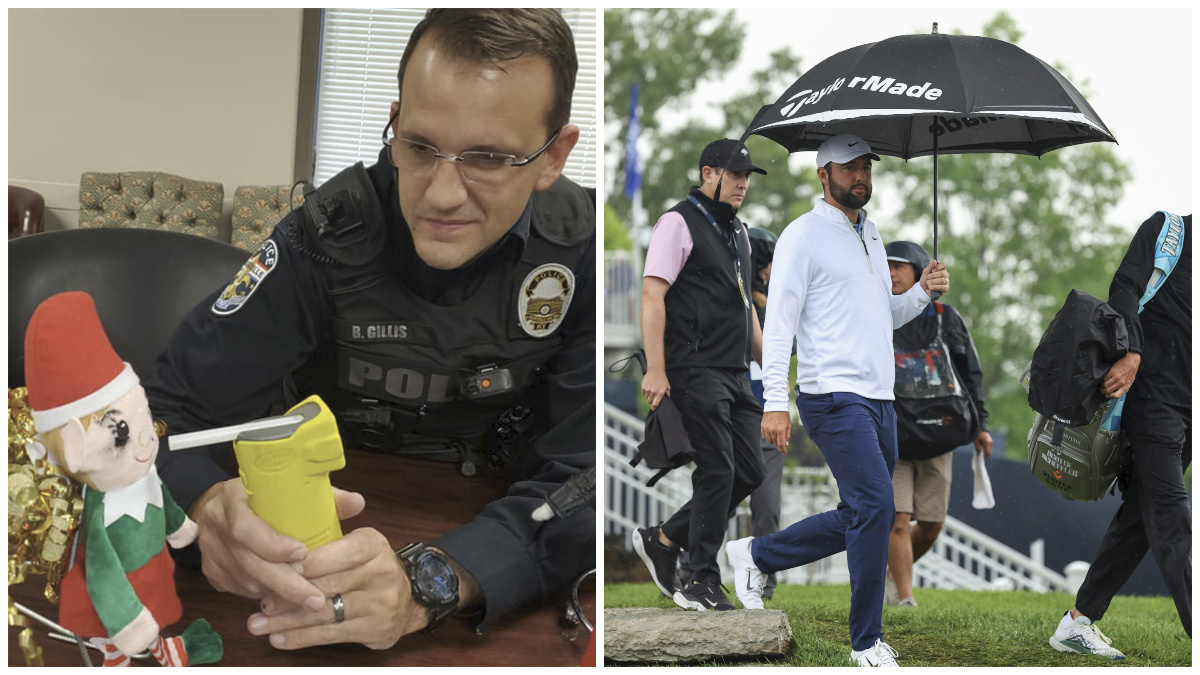Was the arrest of a world-renowned golfer at the PGA Championship in Louisville, Kentucky, a simple misunderstanding, or something more complex? The events surrounding the arrest of Scottie Scheffler, and the subsequent actions of Louisville Metro Police Detective Bryan Gillis, have ignited a firestorm of public interest and legal scrutiny, raising questions about due process, police conduct, and the consequences of a fateful encounter.
The scene unfolded on the morning of Friday, May 17, 2024, just outside the hallowed grounds of the Valhalla Golf Club in Louisville, Kentucky. The air was thick with anticipation as the first day of competition for the PGA Championship was about to begin. However, an hour earlier, a tragic event had cast a shadow over the proceedings: a pedestrian had lost their life in an accident, leading to the closure of both lanes of traffic near the golf course. It was amidst this backdrop of chaos and grief that the paths of Detective Bryan Gillis and golfer Scottie Scheffler were destined to cross.
As Scheffler attempted to navigate around the closure, Detective Gillis, according to the official arrest report, attempted to intervene, attempting to provide instructions to the golfer. However, the situation quickly escalated. According to the report, Scheffler "refused to comply and accelerated forward, dragging Detective Gillis to the ground." The arrest report paints a stark picture of the ensuing events, a dramatic collision that would change the course of the day and launch a series of investigations and media frenzies.
The subsequent arrest of Scheffler, the world's number one golfer at the time, by Detective Gillis, quickly escalated into a national news story. The arresting officer, Bryan Gillis, found himself thrust into the glare of the spotlight, his actions dissected, and his past scrutinized by the media and the public. The incident has raised many questions about police protocols, the use of force, and the specific circumstances surrounding the arrest. This case also opened up a broader conversation about the relationship between law enforcement and high-profile individuals.
According to the police citation released later that day, Detective Gillis was rushed to the hospital after being dragged to the ground. The citation describes that he was left with "pain, swelling, and abrasion" as a result of his encounter with Scheffler's vehicle. Further details regarding Gillis's injuries, including specific diagnoses and treatment, were not immediately available, but the physical consequences of the confrontation were clear.
Adding to the drama, the Louisville Metro Police Department (LMPD) later released a series of photographs depicting the aftermath of the incident. The photos, showing Gillis's injuries and the scene outside Valhalla, served as visual documentation of the events, further amplifying the intense media coverage. These images would also become critical pieces of evidence as legal proceedings continue.
The incident became a turning point in the careers of both men involved, forcing them to confront the unforeseen consequences of a chance encounter. It also served as a test of character for both individuals, placing them under scrutiny from the public eye. For Gillis, it represented a moment that would significantly shape his professional life. For Scheffler, it turned a day of professional competition into a day of public scrutiny.
In the wake of the arrest, a wave of investigations and inquiries was launched. Authorities and public figures began to raise important questions about the event and the handling of the situation. Concerns regarding the use of force, the application of law, and the need for accountability became central themes in this unfolding narrative.
Further complicating the situation, investigations into Gillis's actions were triggered, including an examination of whether he had followed departmental procedures. Reports indicated that the detective may have faced discipline for workplace violations dating back over a decade. This raises questions about the department's oversight and whether previous disciplinary actions had been a part of the equation.
The details of the incident continue to be revealed, with new information emerging, fueling ongoing debate and discussion. The events that unfolded on May 17, 2024, at the Valhalla Golf Club remain a complex and multifaceted story. This incident has opened up dialogue about the interaction between law enforcement, public figures, and the legal system.
As we delve deeper into the events surrounding this incident, it's important to remember the context: a tragic accident, the closure of a major road, and the high stakes of a major sporting event. These elements combined to create a situation that quickly escalated into something far more significant, impacting the lives of everyone involved.
The narrative surrounding the arrest of Scottie Scheffler is constantly evolving. The unfolding story has sparked intense public interest, prompting us to examine the roles of those involved.
| Bio/Personal Information | Details |
|---|---|
| Full Name | Bryan Gillis |
| Occupation | Louisville Metro Police Detective |
| Department | Louisville Metro Police Department (LMPD) |
| Years with LMPD | Since 2007 |
| Division Assignments | 2nd Division (briefly), 8th Division |
| Business Ownership | ACIS Advanced Collision Investigation Services |
| Incident of Note | Arrest of Scottie Scheffler at the PGA Championship, May 17, 2024 |
| Injuries Sustained | Pain, swelling, and abrasions to left wrist and knee |
| Disciplinary Actions | Subject of workplace violation investigations dating back over a decade |
For Further Information: ESPN
Following police training, Gillis was briefly assigned to LMPD's 2nd division, which operates in the west end. He then became a member of the department's 8th division, which operates in the northeast. His service record, including prior assignments and any commendations, is a crucial element for a full understanding of Detective Gillis's career.
In the aftermath of the arrest, another layer of scrutiny came to bear on Detective Gillis's professional conduct. The incident sparked discussion about body camera usage, with questions raised about why his camera might not have been activated during the initial encounter with Scheffler. This raised questions about whether departmental procedures were followed.
As investigations unfold, the broader implications of this incident come into focus. Discussions about the legal standards governing police interactions with the public, particularly in high-profile situations, have become crucial. Issues of force, due process, and accountability are central to these discussions.
The case has brought attention to the Louisville Metro Police Department and its internal policies. Chief Jacquelyn Gwinn-Villaroel announced that Detective Gillis was disciplined in response to the incident, highlighting the seriousness of the matter and the department's intention to take appropriate action. The specific details of the disciplinary measures and their effects remain under consideration.
Gillis's career trajectory, which began with training and assignments in the LMPD's 2nd division, eventually led him to the 8th division. His long tenure with the force, since 2007, provides a foundation for understanding his experience and the context of the events that transpired on May 17, 2024.
Beyond his duties as a law enforcement officer, Gillis also owns a business called ACIS Advanced Collision Investigation Services, further demonstrating his engagement in the community. This detail also adds to the overall picture of his life, providing a deeper insight into his character and his broader professional endeavors. This raises questions of potential conflicts of interest and whether these activities might intersect with his police work.
The public perception of Detective Gillis has been influenced by the release of information about his career and the circumstances of his encounter with Scheffler. Details such as past disciplinary actions have created a complex and evolving picture.
The event has led to a re-examination of police procedures, training, and accountability measures. Many are calling for greater clarity about how police officers are trained to interact with the public, especially during highly visible events. In addition, the use of body cameras and their role in providing accountability are under review.
As the legal and investigative processes unfold, many are now focusing on the potential repercussions for both Gillis and Scheffler. The ongoing proceedings will likely determine the extent of the legal and professional consequences they face.
The events that unfolded on May 17, 2024, continue to generate public and media interest, as more information is released, and investigations continue. The incident underscores the significant responsibilities carried by law enforcement officers and the need for transparency and accountability in the face of public scrutiny.
The arrest of Scottie Scheffler by Detective Bryan Gillis has become a point of debate. This event raises essential issues about law enforcement, public figures, and the legal system. The case's evolution reminds us of the importance of seeking truth and understanding the broader implications of these types of encounters.
The series of events has drawn attention to the importance of documentation, from police reports to photographic evidence. The use of these resources in providing clarity and insight into the unfolding situation is indispensable. This underscores the crucial role that documentation plays in the pursuit of justice.


